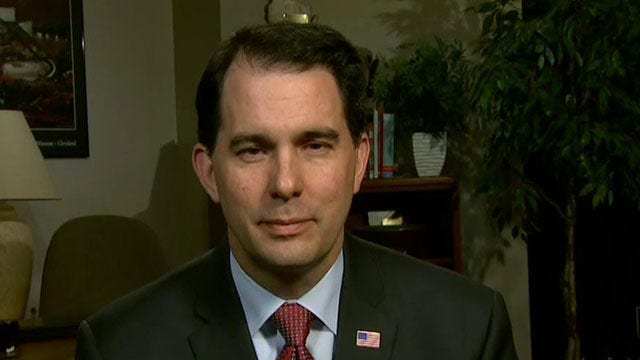Gov. Scott Walker 'very interested' in 2016 presidential run
Wisconsin governor fires up crowd in Iowa
First the unions, now the university system.
Wisconsin Gov. Scott Walker is calling for steep cuts to the University of Wisconsin System, while offering the network more freedom in exchange, in a controversial plan his office says is meant to provide more financial certainty.
The Republican governor, known for his dramatic battles against the public employee unions, moved to overhaul the university system at a time when he's also flirting with a potential presidential bid. Walker, after delivering a rousing speech over the weekend to a conservative summit in Iowa and forming a new political group, told Fox News on Tuesday he's "very interested" in a possible run.
But his university plan, which would cut funding by $300 million over two years, promises to keep him plenty occupied in Madison. The proposal would give more autonomy to the governor-appointed Board of Regents, which oversees the system's 26 campuses, on a wide range of issues, including raising tuition without Legislative approval starting in 2017.
The proposal is already facing criticism from those who say it could allow unchecked tuition increases.
Stephen Nass, a Republican who serves as vice chairman of the Senate's universities committee, said the proposal would expose the middle class to giant tuition spikes.
"I don't trust the unelected Board of Regents to prioritize the plight of middle-class families," Nass said.
The Associated Students of Madison, UW-Madison's student government organization, issued a statement saying tuition increases would be inevitable under Walker's plan.
"UW System administration needs to assure students ... that the ... institutions will not increase tuition as a way to absorb these cuts on the backs of students after this budget," ASM vice chair Derek Field said.
Walker's spokeswoman, Laurel Patrick, said the plan gives UW institutions the flexibility to adjust tuition quickly, making the system more competitive and market-based.
UW System president Ray Cross has acknowledged each institution will feel the $300 million cut but contends more autonomy is an opportunity to operate more efficiently. System leaders believe it's in no one's interest to "simply jack up" tuition, Cross said in an email to The Associated Press on Tuesday.
"What is to everyone's advantage is for us to, as the governor has proposed, work hard on transforming our operations and costs," Cross said.
Walker is trying to solve a projected $2 billion deficit in the 2015-2017 budget.
Under the plan, system leaders would control employee salaries, tenure and procurement contracts, among other things. Future state funding would come through a block grant fueled by sales tax revenue with annual increases tied to inflation. Right now, the state money that goes to the system is a combination of different taxes. The governor and Legislature set the payout amount during budget negotiations every two years.
Walker wants to keep a tuition freeze that the Legislature imposed last year in place until 2017. Then lawmakers would have no ability to limit increases. The system had raised tuition 5.5 percent each of the six years leading up to the freeze.
The governor has said the block grant mechanism would provide the system with more financial certainty and more autonomy would help the system run better.
The proposal is far from a done deal. The Legislature's finance committee will spend months revising Walker's budget before sending it to the full Senate and Assembly for approval. Walker's fellow Republicans control both chambers.
Assembly Speaker Robin Vos, R-Rochester, said he hadn't discussed Walker's plan with fellow Republicans. But he said he worried about making such deep cuts without giving the system the flexibility to deal with them.
A spokeswoman for Senate Majority Leader Scott Fitzgerald, R-Juneau, said Fitzgerald hasn't discussed the plan with his caucus, either.
The Associated Press contributed to this report.













































